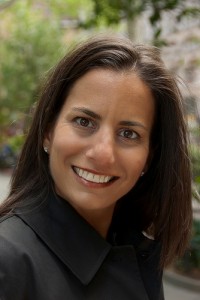To help clients address their eating disorders, Jodi Rubin, ACSW, LCSW, tries to “be mindful of joining people in understanding the ways in which their eating disorder has served them and in doing this, am able to slowly shift into looking at the ways in which it is no longer serving them.”
This week, I had the pleasure of interviewing Jodi Rubin, ACSW, LCSW, a social worker who specializes in relationships, body image, and eating disorders.
Without further ado, Jodi, could you describe a bit of your background?
After obtaining a BA in Psychology, I graduated from NYU School of Social Work in 1999 and immediately obtained my LCSW and ACSW.
I was always drawn to having a private psychotherapy practice so I spent some time speaking with others, who were already in the field, about the pros and cons of receiving a degree in Psychology vs. Social Work. Social Work seemed most aligned with my aspirations.
 What made you decide to specifically focus on eating disorders?
What made you decide to specifically focus on eating disorders?
As with psychotherapy, I always knew that I wanted to focus on eating disorders. For both personal and professional reasons, I feel that the treatment of eating disorders is a true specialty and in order to do it well, I needed to invest myself fully. This was easy for me since I feel so passionately about my work.
What steps did you take in order to be able to create your own private practice focusing on eating disorders?
I began my private practice slowly. Initially I began practicing privately only 1 day a week while maintaining full-time work at an agency.
I did a lot of networking and, little by little, I increased my private practice time and decreased my agency time.
What aspects of the work do you find the most enjoyable?
Of course, I love watching people become curious about themselves while they grow and foster new, healthier relationships with their authentic selves. I feel truly honored to be a part of their process.
What are the aspects that you find the most challenging?
Eating disorders, by nature, are very challenging because they are largely about relationship. This includes the therapeutic relationship.
Engagement and the establishment of trust and rapport are the beginning of any treatment however, in treating eating disorders, it is a critical part of treatment that requires time and patience.
Is it true that a person’s relationship with food is actually a reflection of their relationship with themselves and others? And if so, how?
Generally speaking, it is true that a person’s relationship with food is very much about their relationship with emotions, others and themselves. It is a true metaphor.
Those struggling with eating disorders use food to manage what they allow in and what they keep out of themselves, their psyche, their consciousness, their lives and their bodies.
Has the rate of eating disorders been on the rise? And if so, what do you believe are the key reasons for this?
Eating disorders have been on the rise across race, gender, culture, socioeconomic status, etc. Cultural messages may have a great impact on this. However, to be clear, while cultural factors can have influence, they are not critical to the development of an eating disorder. There are genetic, familial and psychological factors that play a larger role.
What are your thoughts about the health at any size movement (HAES)?
It’s about honoring your body. I support that.
Are there any pieces of advice that you would you offer parents who are trying to prevent their children from developing an eating disorder?
Be a conscious role model for your children. Model empowerment and demonstrate what it means to honor your authentic self. Be clear and intentional about the messages you want to send to your children.
Understand your own relationship with food and exercise and the explicit and implicit messages you are sending.
Are there “good” and “bad” foods in your home? Do you restrict calories in order to allow yourself dessert? Do you stand in front of the mirror and say negative things about yourself or your body? How does your size and shape impact your self-esteem?
These are just a few of many ways in which we unwittingly teach our children how to feel about themselves and their bodies.
How typical is it for clients to be in denial of having an eating disorder? And if so, what are some ways that you address this?
Often times people enter treatment at the request or their loved ones, so they may not be ready to acknowledge what is going on in their lives. I try not to convince people that they are struggling as much as I try to understand their perception of what is happening, including how they understand the concerns of those around them.
Denial of a problem can also be a fear of losing something that feels helpful. In general, I try to be mindful of joining people in understanding the ways in which their eating disorder has served them and in doing this, am able to slowly shift into looking at the ways in which it is no longer serving them.
By truly understanding this with my patients, trust and safety become established and through this, it is possible to explore healthier and more effective coping skills.
Also, are there any suggestions that you could offer parents who have a teen who is in denial of having an eating disorder and/or refuses to go for help to address this problem?
It is best to express your concerns away from emotionally charged moments and outside of mealtimes.
Don’t focus only on the food, share your concerns about your teen’s mood or anything else you notice, e.g.: increased isolation, disinterest in previously enjoyed activities, spending less time with friends, etc.
Also, it can be very helpful for a parent to consult a professional to evaluate the potential problem and to help guide you in addressing what is going on.
Finally, what career advice would you offer upcoming MSW graduate students interested in pursuing a career in helping people with eating disorders?
I would encourage students who are interested in working with those struggling with eating disorders to seek out supervision, their own treatment and post-graduate training/education focused on working with eating disorders.
View your learning, growth and knowledge as a lifelong process and throughout your career, make sure that you are doing what you need to do in order to take care of yourself.
This is exciting, and difficult, work. Self-awareness and self-care are critical!
Thanks so much, Jodi, for sharing with us this valuable information about the eating disorders arena!
As always, please feel free to ask any questions, or make any comments. Your feedback is most appreciated 🙂
Photo credits: webtreats
Wood Background in Emerald Pumpkin



Thanks for this informative interview!
Are there any books that you would recommend to a layperson on eating disorders?
Thanks!
A great book for anyone who has someone in their life struggling with an eating disorder is “Surviving an Eating Disorder” by Judith Brisman.
Jodi R. Rubin, ACSW, LCSW
412 Sixth Avenue, #707
New York, New York 10011
212.529.5811
Very interesting interview about such an important topic. I thought her advice about when to bring up your concerns as a parent were very good. So many of us have delicate relationships with food and with people in our lives. We are complex beings.
Thanks so much for sharing your feedback and thoughts on this interview, Terry 🙂
Yes, we are indeed complex beings…I think being the positive role model that Jodi recommends being for one’s children is a great goal to strive for. However, I also feel that it is an immensely challenging one in this highly body conscious society…
Very interesting post, thanks! Your comments about not dividing foods into “bad” and “good” foods is one that I commonly hear recommended, but I’m not sure I’ve ever heard anyone fully articulate the rationale behind that recommendation. While I have my own theories about what the rationale might be, I would really like to hear you say more about it from your perspective.
For me, the perspective of having no “good” or “bad” foods is about having a healthy relationship with food, a balanced lifestyle that includes moderation.
Separating foods into “good” and “bad” promotes a diet mentality where we then begin to keep foods off limits, which may ultimately lead to overeating those particular foods in times when the opportunity arises.
Or as a reward, e.g.: you’ve been “good enough” with your food for the day that you “deserve” a treat. Or as a source of negativity towards oneself, e.g.: you’re “bad” for having dessert.
Even with good intentions, these messages can lead to confusion and anxiety for children. What happens when kids have snack time or are faced with cake at a birthday party?
This being said, there is no black and white outcome as to how your child can/will internalize these messages however, I do strongly believe that it is worth considering our own personal motivations for creating these rules around food and how these motivations are communicated to our children.
Jodi R. Rubin, ACSW, LCSW
412 Sixth Avenue
New York, New York 10011
212.529.5811
Thank you for sharing your expertise! After reading I’m still not very clear what the role of a social worker is in helping people with eating disorders. Everything in the interview sounds more like psychological/psychotherapeutical work. It is particularly interesting to me, because my first degree is in psychology, and now I study social work – it is important to have a clear distinction! Also, if you could recommend some articles on eating disorders in children and adolescents (and the role of social workers), that would be great!
Hi Anna,
Thank you for your interest and questions. Jodi Rubin, the social worker interviewed for this post, works with individuals who have eating disorders and through clinical social work (a variation of psychotherapy) and recommended treatments for eating disorders, she is able to help them lead healthier relationships with themselves, others and their food.
I will try to reach out to Jodi to see if she can respond to your query directly. If she will be unable to respond, I will save your questions for a future interview on eating disorders.
Best,
Dorlee